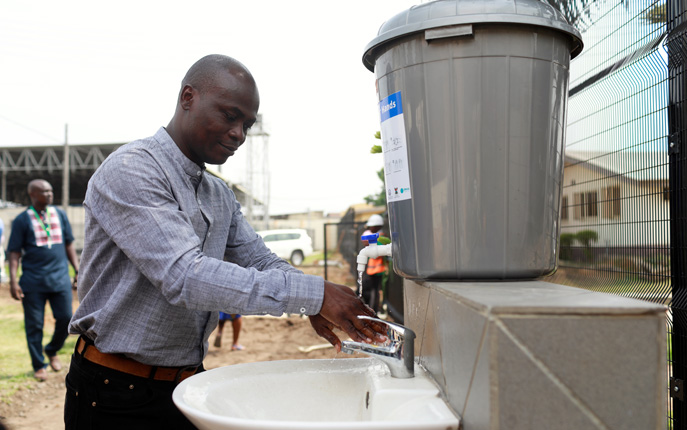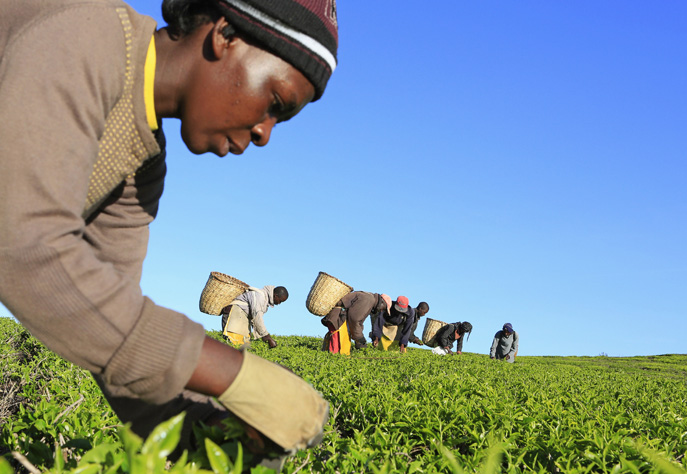With one in four health facilities lacking basic water services, Mark Hillsdon reports on how Unilever and Colgate-Palmolive are among the companies helping to tackle the critical issue of water, sanitation and hygiene
With hand washing flagged up as one of the most important ways of preventing the spread of Covid-19, the predicament of the billions of people around the world who don’t have access to a safe, clean and regular supply of water, has been brought into sharp focus.
According to the World Bank, an estimated 785 million people are living without a basic level of water service, and more than two billion lack access to a toilet at home. In many countries, the World Health Organization (WHO) has also shown that even hospitals lack these amenities, with a recent report revealing that one in four healthcare facilities lack basic water services, while more than one in five had no sanitation service.
Yet safely managed water, sanitation and hygiene (WASH) services are seen as essential to preventing disease and protecting human health, especially during outbreaks of infectious diseases.
It’s not that the challenge has changed, or the problem, it’s just the sudden urgency around it
“Globally, we haven’t solved this issue of people having access to very basic services which underpin public health,” explains Harold Lockwood, a director at AguaConsult, a consultancy that specialises in water and sanitation issues.
Diarrhoea alone kills 500,000 children every year, he says: “It’s not that the challenge has changed, or the problem has changed, it’s just the sudden urgency around it.
“If you want to improve health, you’ve got to have a volume of water that’s relatively clean, somewhere to safely put excreta, and the ability to wash hands.”

With the full impact of the pandemic on sub-Saharan Africa still unknown, the WHO is promoting handwashing in a number of ways, including the #SafeHands Challenge, which encourages people, including celebrities, to upload clips of themselves washing their hands on to social media.
It is designed to push the message in vulnerable communities that properly washing hands can kill the virus, and is being backed by a donation of 25 million bars of soap from Colgate-Palmolive.
Unilever has also stepped up and is working with the UK government to fund a global programme that will reach up to a billion people, by providing over 20 million hygiene products to areas where there is little or no sanitation. In conjunction with the London School of Hygiene & Tropical Medicine, it too is staging a mass awareness campaign on the importance of handwashing in a bid to change people’s behaviour in countries across Africa and Asia.
Corporations, through their size, can make commitments to ensure their workforce is healthy
In developing countries, the private sector can be responsible for as many as nine out of 10 jobs, which puts them in a unique position to impact and influence billions of people every day. “Corporations, through their size, can do things directly,” says Lockwood, “they can be advocates [and] make commitments to ensure their workforce is healthy.”
WASH4Work sets out how companies should be ensuring their employees have access to safe drinking water, improved sanitation and adequate hygiene to meet their health, safety and dignity needs.
Established by the UN Global Compact, in 2016, the initiative doesn’t track the number of companies involved or how many employees are covered, though a spokesman said Unilever, Diageo and Gap are part of the scheme.

Businesses are also encouraged to push the importance of hygiene along their supply chain, and in the communities where their workers live.
As with so much around the current pandemic, there is a sense that once the virus has been brought under control, issues around the inequitable supply of water and lack of sanitation must not be allowed to continue. Businesses, both through direct action and also their investments, can play a central role in creating a more resilient water supply in developing countries.
This is the thinking behind the new Water Resilience Coalition, a partnership between business and the UN’s CEO Water Mandate, that will take a more broader view of water issues than just the WASH agenda, in a bid to preserve the world’s freshwater resources.
Water is one of the most pressing issues of our time and we need to act now; we cannot afford to wait
Among the founders are AB InBev, Diageo and Gap Inc, all of which have a vested interest in ensuring that water resources are sustainable, resilient and ample enough to serve both the needs of society and industry.
“Water is one of the most pressing climate and community issues of our time and we all need to act now to make a positive difference; we cannot afford to wait,” says Diageo CEO Ivan Menezes. “Those of us in the private sector have an incredibly important part to play, and we need to collaborate more to share knowledge, best practice and solutions – as well as drive significant action across our own supply chains.”
More than 25% of the world’s population live in water-stressed regions, and the coalition aims to build up the resilience of these water basins through a mixture of innovation, collaboration and investment in infrastructure.

The WHO has stressed that investing in core public health infrastructure, including water and sanitation systems, is one of the most cost-effective strategies for increasing pandemic preparedness, especially where resources are limited; the issue is making such investments attractive.
“It’s very hard to engage with big corporations until they see that it’s beneficial from a business and commercial perspective,” says AguaConsult’s Lockwood, who wants to see water given the same level of prominence in risk registers as other environmental factors, such as carbon emissions.
Therese Rudebeck and Sarah Breslin work on water issues within the financial and banking industries for Swedish Water House, part of the Stockholm International Water Institute (SIWI). “It is easier to get a grasp of and quantify a carbon footprint, but much harder to do the same with water,” says Rudebeck. “A key point for SIWI is showing corporates that you can’t separate water from climate change; they are not separate issues.”
Something that we do see with this crisis is the importance of a resilient system
Their work is aimed at encouraging banks and financial investors to think more carefully about how they invest their money.
“So far, ESG analysis has mainly consisted of negative screening,” says Breslin, “so you want to exclude certain types of industries for moral and environmental reasons.
We are trying to shift that focus and take things a step further so you can actually promote best practices instead of just avoiding the worst players.”
This requires in-depth knowledge and engagement from the investors, she adds, which can be a challenge as many portfolios are passively managed. “It needs to become a priority [for investors] if we are going to see any real change.”

SIWI is working on practical guidelines to help investors integrate water into portfolio management, building on the Investor Water Toolkit, developed by the US non-profit organization Ceres.
This toolkit allows investors to evaluate water risks across all asset classes and create strategies for understanding and mitigating water risks in their investment portfolios. While much of their work is currently carried out with Nordic organisations, Swedish Water House is using its experience to contribute to the international push for a more water-wise world and is currently exploring how to apply the EU’s new regulatory landscape on sustainable finance to investors’ engagement with water.
“Something that we do see with this crisis is the importance of a resilient system,” says Rudebeck. “For a long time, we have seen environmental, human and economic health as three separate spheres and I think this crisis really does bring those three things together.”
There is money to be earned by doing this, not just money to be saved
Rudebeck also believes that issues around water have been framed as risks for too long. To really engage with business, things like developing a strong water infrastructure need to be reframed as an opportunity.
“It’s not just a risk-alleviation strategy, it needs to be seen and understood as a value proposition,” she says. “There is money to be earned by doing this, not just money to be saved... That’s where the real enthusiasm could come from.”
Mark Hillsdon is a Manchester-based freelance writer who writes on business and sustainability for Ethical Corporation, The Guardian, and a range of nature-based titles including CountryFile and BBC Wildlife.
Coronavirus SDG6 WHO WASH AguaConsult Colgate-Palmolive Unilever WASH4Work Water Resilience Coalition CEO Water Mandate Diageo SIWI ESG Investor Water Toolkit

